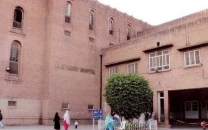Poor implementation: Information commissioners have no offices, staff
‘The Punjab Information Commission is clearly not on the govt’s list of priorities’.

A screenshot from the website. PHOTO: rti.pitb.gov.pk/
It has been over a year since the Punjab Transparency and Right to Information Act (RTI) 2013 was promulgated, yet the government has been unable to provide premises for the information commissioners appointed under the Act.
Requesting anonymity, a senior government officer said the information commissioners, including the chief information officer, were working from home while their mail and applications from petitioners went to the offices of the information secretary and two other secretaries.
Mukhtar Ahmad Ali and Additional Inspector General Ahmed Raza Tahir were appointed information commissioners, and Justice (retd) Mazhar Hussain Minhas was appointed chief information commissioner on March 5, 2014.
According to Clause 14 of the RTI Act 2013, the commission shall “establish a secretariat, hire the requisite staff to conduct its business properly, and promote access to information among the public, public servants and civil society”. However, not only do the information commissioners not have office premises, but they also don’t have any staff at their disposal.
Ali, one of the information commissioners, admitted that he had neither an office nor staff. He said: “Despite unavailability of space and staff, we are doing our job to the best of our abilities and are disposing of complaints.” He said that the commission had received more than 800 complaints so far, out of which, around 400 cases had been decided.
The official said that the commissioners had been asked to stay at home and draw salaries till further directives.
Ali said he worked from home. When asked if petitioners’ applications and complaints were mailed directly to his house, Ali said that complaints and applications went to various offices, especially to the information secretary’s office, and the assigned cases were sent to his house. “I decide the cases from there.”
He said that they had requested the government to provide office premises. The government had published an ad for a building last month, he said.
“A building has been selected near MM Alam Road...the office will be set up there in the beginning of April.” However, he said that the office would not be functional for a few months as the government would have to procure furniture and there was staff to be hired.
“We simply can’t traipse into a shop and buy the furniture...the government will publish another ad for that.” He said the commissioners would have to recruit staff on their own.
According to sub-clauses F and G of Clause 6 of the RTI Act 2013, “the commission will have to undertake a mass awareness campaign to create awareness about the Act, rules and regulations as well as establish an information web-portal.” However, neither the awareness campaign nor the web-portal has been launched so far.
Ali said that the Information Commission’s website was expected to be launched next week. He said the PITB was working on the project and there had been a delay only because content development for the website was taking time.
Another official said when the Act was promulgated the government had not allocated a budget for it or approved the rules for the PIC. “It had never been a priority for the government.”
Ali said rules for the commission had been approved in December 2014, the official notification for which was released in January 2015. He said a budget for the commission was approved in October, 2014, along with a schedule of costs.
The government violated Clause 7 of the RTI Act 2013 which states that a public body “shall within 60 days of the commencement of the Act designate and notify as many officers as public information officers in all administrative units or offices under it, as may be necessary”.
Ali said 700 public information officers were to be appointed for the commission. He said 250 public information officers had been finalised. He said all government departments had to appoint their public information officers. He said so far 12 training sessions had been held by the Management and Professional Development Department (MPDD) for the public information officers.
An officer at the Punjab Information Commission said of the several complaints they had received, one was about the expenditure of the CM’s House. The information had not been provided, he said.
Ali said, “I have asked the CM’s office to provide the required information.”
The officer said another applicant had asked the commission for the joint investigation team’s report on Model Town violence but the commission had been unable to provide the information.
Ali replied that he was unaware of the application.
The Punjab Transparency and Right to Information Act (RTI) 2013 was passed on December 13, 2013. It became an Act after it received the governor’s assent on December 16.
Published in The Express Tribune, March 11th, 2015.



















COMMENTS
Comments are moderated and generally will be posted if they are on-topic and not abusive.
For more information, please see our Comments FAQ